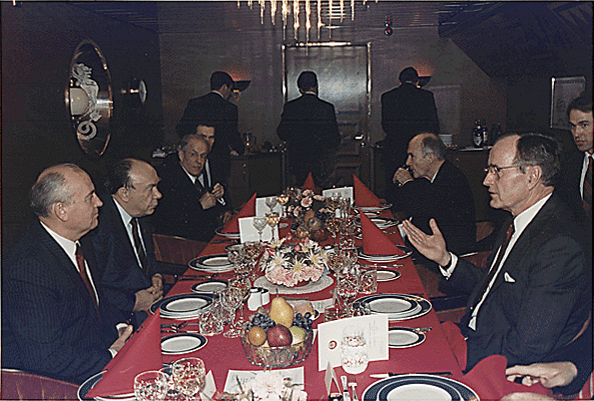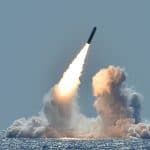George H.W. Bush’s Legacy: Exit from “Tension City”
By Matt Field | December 3, 2018
 Former US President George H.W. Bush with former Soviet leader Mikhail Gorbachev. Credit: National Archives and Records Administration
Former US President George H.W. Bush with former Soviet leader Mikhail Gorbachev. Credit: National Archives and Records Administration
Former President George H.W. Bush, who died Friday at the age of 94, will be remembered for the many contradictions of his presidency and its aftermath. He was a prudent man who made an imprudent promise that may have cost him the presidency; a president who achieved a limited victory over Iraq in 100 hours but whose son would draw the United States into a prolonged war in that same country; and a cold warrior who showed restraint as the Soviet Union began to crumble in order to guide friends and foe alike toward a “new world order.”
For 40 years the United States and the Soviet Union had been locked in an unyielding dynamic characterized by wars, proxy wars, political oppression, and, of course, nuclear brinkmanship. In 1986, the United States and the Soviet Union had stockpiled more than 60,000 nuclear warheads between them. By 1991, the year the Soviet Union finally collapsed, that number dropped by more than 10,000. That year, the Bulletin set the Doomsday Clock as far back as it’s ever been: 17 minutes to midnight.
“We believe that presidents Bush and [Mikhail] Gorbachev have guided their respective nations to a historic intersection of mutual interests,” an editorial in the Bulletin stated. “Continuing boldness and imagination are called for. Men and women throughout the world must vigorously challenge the bankrupt paradigms of militarism if we are to achieve a new world order.”
Bush had a famously warm relationship with Gorbachev, as many have commented on in recent days.
“Mr. Bush saw an ally and a kindred spirit in Mikhail Gorbachev, the leader who tried to reform the Soviet system through “glasnost” (openness) and “perestroika” (economic reform),” notes an obituary in the The Washington Post. “Mr. Bush said that he ‘could sit down and just talk. I thought I had a feel for his heartbeat. Openness and candor replaced the automatic suspicions of the past.’”
Bush worked closely with European leaders to smooth the transition out of 40 years of Cold War, at points appearing unenthusiastic about breakthrough moments such as the fall of the Berlin Wall. As The New York Times reports, Bush had a reason for not showing himself as visibly supportive. “If we mishandle this,” he said, speaking of the rebellions in Eastern Europe, “and get way out looking like an American project, you could invite crackdown and invite negative reaction that could result in bloodshed.”
One abiding irony of Bush’s prudent approach to international affairs is, of course, the Gulf War. Bush confronted former US ally Iraq after its leader, Saddam Hussein, ordered an invasion of Kuwait. Bush ended hostilities just 100 hours after beginning the attack that evicted Iraqi forces from Kuwait. His son, former President George W. Bush, picked up where his father left off and proceeded to ensnare the United States in years of conflict in Iraq. As Foreign Policy notes, “It may well be that Bush junior’s decision to invade and occupy Iraq in pursuit of ‘democratic transformation’—at a time when the job against al Qaeda in Afghanistan was unfinished—was the worst strategic misdirection in the nation’s history.”
The same prudence the elder Bush exhibited on the international stage often eluded him in front of domestic US audiences, where he seemed to have trouble articulating himself. The Times obituary notes that he became known for malapropisms and for introducing unique words into the language of US politics; “Tension City,” for instance, meant challenging times. From Bush’s standpoint, the most unfortunate statement he made may have been his now-infamous “no new taxes” pledge. When he went on to raise taxes, he was haunted by the broken promise. The Republican Bush, of course, broke that imprudent pledge as part of an agreement with Democrats to raise taxes in order to shore up the nations’ shaky finances—a move that turned out to be prudent, indeed.
Publication Name: The New York Times
To read what we're reading, click here
Together, we make the world safer.
The Bulletin elevates expert voices above the noise. But as an independent nonprofit organization, our operations depend on the support of readers like you. Help us continue to deliver quality journalism that holds leaders accountable. Your support of our work at any level is important. In return, we promise our coverage will be understandable, influential, vigilant, solution-oriented, and fair-minded. Together we can make a difference.
Keywords: Cold War, Doomsday Clock, George H.W. Bush, Gorbachev, Gulf War, Iraq, Soviet Union
Topics: Analysis, Doomsday Clock, What We’re Reading














